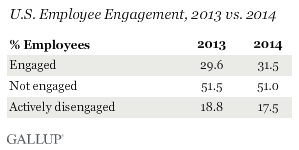Have you ever been frustrated at the lack of commitment or enthusiasm in your office?
Engaging staff will increase positive energy, productivity and profits in your practice. This may sound easy, but it requires a plan and consistent effort on your part as a leader in your practice.
Gallup describes the "engaged" employee as "one who is enthusiastic and committed to their work and workplace." Kevin Kruse, Employee Engagement 2.0: How to Motivate Your Team for High Performance, 2012, defines employee engagement as "…the emotional commitment to the organization and its goals."
Although employee engagement is at its highest since 2000, a December 2014 Gallop poll reported only 31 percent of employees are "engaged" in their work. That leaves a whopping 69 percent "not engaged" or "actively disengaged" employees. Disengaged workers take more sick days, do not go the extra mile for patient satisfaction, make more costly mistakes and leave your practice four times more often than highly "engaged" employees.

The "Step It Up" Plan
It all begins with you. Your staff notices everything you do: good, bad or indifferent, and they will follow your lead. Make a plan to engage and energize your practice. Why? Because engagement drives performance and performance drives profits and provides a healthy and happy work environment for everyone.
Get to Know, Believe in and Trust Your Staff
There is solid research showing that people are more motivated by intrinsic rewards (meaningful relationships, personal growth, contributions) than extrinsic rewards (money, fame, beauty) today. Recent research also indicates the majority of engagement comes from one's relationship with a boss or direct superior.
Take the time to get to know your staff and what motivates each of them. Understand what makes them tick and allow them to know you as a person too When you begin to know and care about your employees they will in turn care about you and your practice. Once you know each person, your trust and confidence in him or her should grow; if it doesn't then there is a different problem that must be addressed. The next step is communicating your trust and confidence in your employee.
Communication
Communicating consistently is hard for many folks, but it delivers the most positive results in engaging people. Make a plan to communicate in different ways – through small meetings, written announcements or updates, and short individual meetings on a regular basis. Just walking through the office and complimenting people or expressing appreciation on a regular basis will go a long way. Telling your staff you appreciate them once a year at the holiday lunch is not enough.
Providing growth and development opportunities for your employees communicates that you care about them and engages them even further. Whether it's sending them to a seminar, reimbursing them for college classes or simply giving them an article or book to read, you're demonstrating that you care about them as people.
Recognition: The Most Motivating Reward
Catch your employees doing something right – and tell them. People crave appreciation. However most often what I see and hear in practices is only what has been done wrong rather then right. This destroys trust and confidence over time.
Listen First. Set Improvement Goals Together
Meet with your staff as a group and also individually on a regular basis. Listen carefully. Listening – really listening – is critical. If your staff trusts you, they will share. If you want to make improvements to your practice, this is the team that will help you succeed. Highly engaged employees are more likely to recommend improvements. They have the solutions. Set measurable goals and report the success. Reporting the success gives you a reason to celebrate together and set another goal.
It's Up to You
You have the key to unlock your employees' engagement in your practice. Model the behavior and excitement you wish to create. If the culture of your practice is negative and disengaged, "Step it Up." Get to know and appreciate each person, communicate often, and give them responsibility and challenging work. Then watch your practice thrive.

Mindi Lewis, MA, ABOC, FNAO, is the Managing Editor of The 20/20 Opticians Handbook. She is currently an optician at MarinEyes, a multi-doctor practice in San Rafael, California. Mindi has had held positions in marketing, training and sales at SOLA Optical/Carl Zeiss Vision and Vision Ease Lens. She is a graduate of and former Instructor at St Petersburg College, Optometric Technology program. She also has a Masters degree in Psychology and Organizational Development from Sonoma State University. Mindi has loved all things related to vision and optics for many years and lives in Petaluma, California with her husband Craig and wonderful doggie Max.












